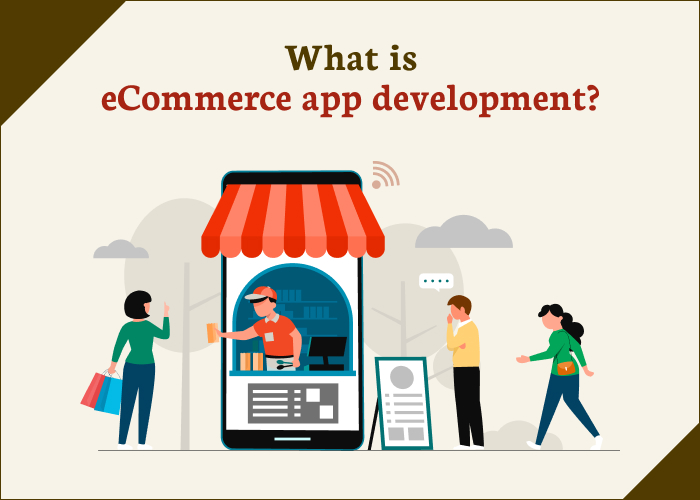What is eCommerce app development?

The development of a smartphone app that facilitates online buying is known as an eCommerce app development. It can come in several forms. As an illustration, a smartphone app links consumers to a company’s online store or marketplace, like Amazon or eBay. One well-known example of one of these applications is Uber.
An eCommerce app may be created for a variety of business areas, including online tuition, on-demand home services, furniture and car rentals, food delivery, grocery delivery, and more, due to the size of the e-commerce market.
Why develop an eCommerce app?
Businesses can gain a variety of advantages from enhanced brand awareness and operational efficiency to higher sales and consumer engagement when they develop an e-commerce app.
Apps make it simple for customers to browse and purchase things with features like one-click shopping, quick navigation, and tailored product suggestions. This increases consumer happiness and loyalty.
With specialized ecommerce app development, businesses can capitalize on the growing industry of mobile commerce. Businesses may boost conversion rates and eventually boost sales and income by making it simpler for customers to peruse and buy things on their smartphones or tablets.
In this congested industry, a well-designed eCommerce app may help firms stand out as a potent branding tool. Businesses may fortify their brand identity and raise brand awareness among their target audience by providing a recognizable and consistent brand experience through their app.
Furthermore, by creating an e-commerce application, companies can connect and interact with consumers who are accustomed to using mobile devices first, grabbing their interest and increasing revenue on a practical and user-friendly platform.
Apps for e-commerce offer significant insights into the behavior, preferences, and purchase habits of customers. Businesses may better fulfill consumer wants and spur business growth by optimizing their marketing tactics, inventory management, and product offers via the use of analytics tools and data-driven decision-making.
How much does it cost to develop an eCommerce app?
An eCommerce app development cost can vary greatly based on a number of variables, such as the app’s complexity, features and functionality, platform compatibility, design specifications, location and rates of the development team, and more.
More sophisticated features like personalized recommendations, social sharing, loyalty programs, and integration with external services like payment gateways, shipping companies, and analytics tools will cost more than basic features like product listings, shopping carts, and checkout capabilities.
The application’s development cost is also largely determined by its design. Personalized UI/UX design based on your target market and brand identity will cost more than utilizing simple or pre-made templates.
Development teams charge different charges based on where they are located and how experienced they are. When choosing between offshore development teams and teams located in areas with higher labor costs, it’s important to take quality and communication issues into account. Offshore development teams may provide lower prices.
Thus, depending on the location of a software development business, different costs apply. In contrast, app designer hourly charges in the USA and Canada begin at $150, but in India, they might range from $50 to $100.
Conclusion
In conclusion, eCommerce app development is essential in the current digital environment, providing companies with a host of advantages including better consumer interaction, elevated brand recognition, greater revenues, and access to insightful data analytics.
However, it’s important to take into account the disadvantages and difficulties of developing an e-commerce app, such as the upfront expenditures and the continuous upkeep and support requirements. Notwithstanding these difficulties, e-commerce applications provide many more benefits than disadvantages, making them a vital resource for companies hoping to succeed in the cutthroat realm of online sales.
FAQs
What are the key features to include in an eCommerce app?
Essential features include product listings, shopping carts, secure payment gateways, user profiles, order tracking, and push notifications. Additional features like personalized recommendations, social sharing, and loyalty programs can enhance the user experience further.
How long does it take to develop an ecommerce app?
The development timeline can vary depending on factors such as app complexity, features, design requirements, and the development team’s availability. On average, it may take anywhere from a few months to a year to develop a fully functional e-commerce app.
How can businesses ensure the security of their e-commerce app?
Implementing robust security measures such as encryption, secure authentication, and regular security audits can help protect sensitive customer data and prevent security breaches. It’s also essential to comply with industry regulations and standards regarding data privacy and security.
What are the best practices for marketing an e-commerce app?
Effective marketing strategies for e-commerce apps include app store optimization (ASO), social media marketing, email marketing, influencer partnerships, and paid advertising campaigns. Building a strong brand presence and offering incentives such as discounts and promotions can also attract and retain users.
How can businesses measure the success of their e-commerce app?
Key performance indicators (KPIs) such as conversion rate, average order value, customer retention rate, and app store ratings and reviews can help businesses evaluate the success of their e-commerce app. Analyzing user engagement metrics and conducting customer surveys can also provide valuable insights into app performance and user satisfaction.
Ravi Bhojani is the Chief Marketing Officer (CMO) at Alian Software, where he spearheads the company’s marketing strategies and drives its brand presence in the competitive IT services landscape. With over a decade of experience in the technology and marketing sectors, Ravi has consistently demonstrated his ability to blend innovative marketing techniques with deep industry knowledge to deliver outstanding results.